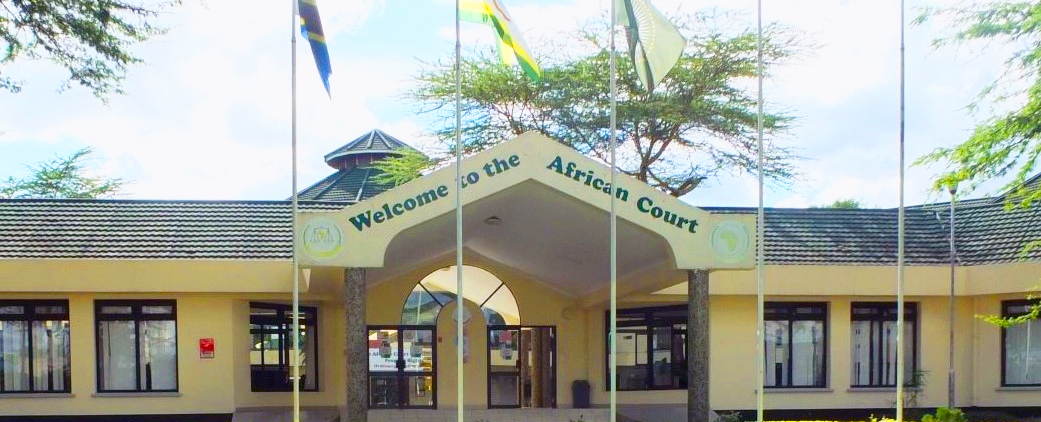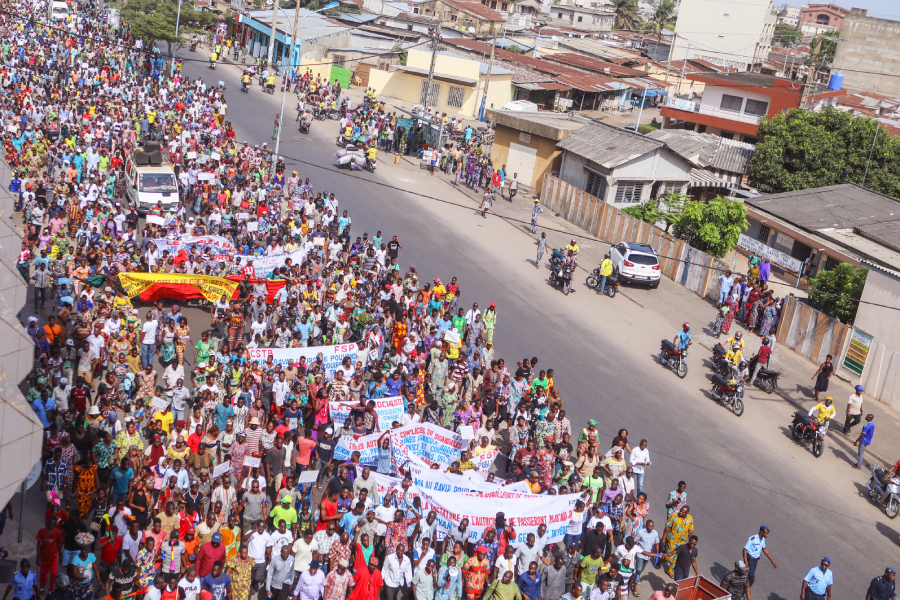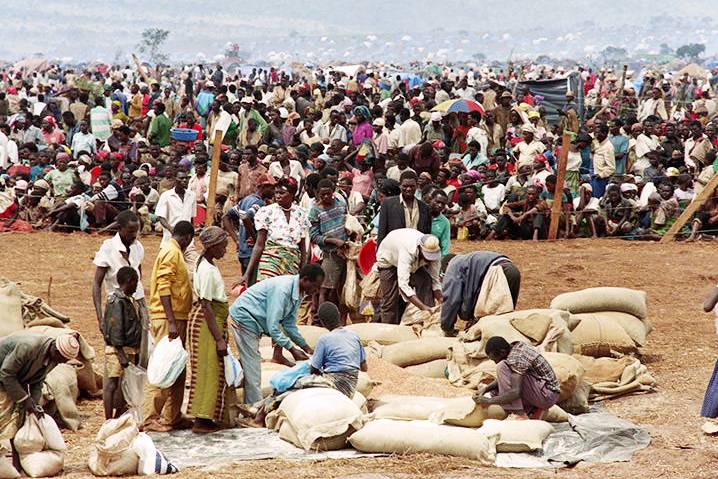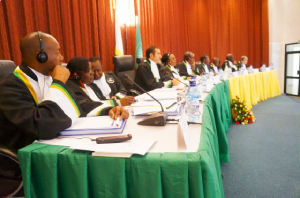English | Français

The African Court on Human and Peoples’ Rights in Arusha, Tanzania. (Photo: AfCHPR)
Emerging from decades of debate on ways to curb impunity in Africa, crystallized by the Rwanda genocide and the wanton violence that marked the wars in Liberia and Sierra Leone in the 1990s, the African Court on Human and Peoples’ Rights (AfCHPR or African Court) was established by member states of the Organization of African Unity (OAU) in 1998. The African Court’s mission is to protect human rights enshrined in the African Charter on Human and Peoples’ Rights (African Charter) of 1981, which states in its preamble that “freedom, equality, justice and dignity are essential objectives for the achievement of the legitimate aspirations of the African peoples.”
All African states are signatories to the African Charter, which upholds fundamental civil and political rights, like the freedom of speech and assembly, the right to free and fair elections for citizens to select their representatives, equal treatment under the law, the right to a fair trial, and the prohibition against torture. The African Charter also stands out as the sole international human rights instrument that provides socioeconomic and group rights as interdependent with political rights.
The framers of the African Charter foresaw scenarios where national courts would be unwilling or unable to handle cases involving the abuse of power by the executive branch.
When it comes to enforcement, the framers of the African Charter foresaw scenarios where national courts would be unwilling or unable to handle cases involving the abuse of power by organs of the state, mainly the executive branch. They recognized that in such cases, citizens needed an avenue to table their complaints and receive redress for wrongs committed after exhausting domestic mechanisms. The OAU, later the African Union (AU), granted the African Court the legal authority to uphold and interpret the African Charter.
Established during a period of emerging democratization on the continent, the AfCHPR crystallized efforts to institutionalize norms and human rights standards as the OAU was transitioning to the AU with the aim of being a more effective and cohesive regional body and a genuine forum for regional accountability. The African Court was also intended to be an African judicial instrument to complement international courts, like the International Criminal Court (ICC). African governments have, at times, accused the ICC of disproportionately targeting Africans, even though African countries led the effort to establish the ICC.
These norms and standards have come under renewed strain in recent years with democratic backsliding on the continent and growing indications of impunity across the world. An African supranational avenue for legal redress has proven to be essential, given that national judiciaries in numerous contexts have either been co-opted or captured by ruling parties. While significant efforts have been made to modernize justice systems across the continent, judiciaries in Africa have remained largely power-oriented and remote from the citizenry.
It is an opportune moment, therefore, to take stock of the African Court, its role, accomplishments, and ongoing challenges.
How the African Court Works
Based in Arusha, Tanzania, the African Court came into force in 2004 when the protocol establishing it had been ratified by more than 15 countries. Its first judges were appointed in 2006 and it began operations in 2008. It is comprised of 11 judges from across the continent who serve 6-year terms, renewable once. The judges are elected by the AU Executive Council based on nominations from member states and subsequently appointed by the AU’s Assembly of Heads of States and Government. The AfCHPR holds four ordinary sessions annually and extraordinary sessions when convened by its president.
A distinctive feature of the African Court is that citizens can bring cases directly to it. It is one of just three regional human rights courts (together with the European Court of Human Rights and the Inter-American Court of Human Rights) that has the power to hear cases from aggrieved citizens against their governments and order binding remedies where the alleged violations are established.
The AfCHPR is therefore intended to play a critical role in preserving and safeguarding human rights, promoting norms and standards of conduct, and advancing the rule of law, democracy, and stability in Africa.

A demonstration organized by Benin’s political opposition against the erosion of democratic norms. (Photo: AFP)
The African Court can receive cases filed by state parties to the protocol establishing it, African intergovernmental organizations, and the African Commission on Human and Peoples’ Rights (African Commission) with which the AfCHPR shares responsibility for interpreting and applying the African Charter.
The African Court can also hear complaints by an individual against a state, provided that the latter has accepted the AfCHPR’s jurisdiction to receive cases from its nationals and nongovernmental organizations (NGOs) that have observer status with the African Commission, a mechanism provided under Article 34(6) of the protocol establishing the AfCHPR. If it finds that it has jurisdiction and the application brought before it is admissible, the AfCHPR will hear the case on the merits and may consider requests for reparations where violations are established.
There are 34 AU member states so far that have ratified to the protocol establishing the African Court. Of these, eight recognize the AfCHPR’s jurisdiction to accept applications by individuals and NGOs: Burkina Faso, The Gambia, Ghana, Guinea-Bissau, Malawi, Mali, Niger, and Tunisia. Four other countries have withdrawn their declarations recognizing the AfCHPR’s jurisdiction: Rwanda (in 2016), Tanzania (2019), Benin (2020), and Côte d’Ivoire (2020).
When ascertaining jurisdiction, the AfCHPR must ensure a four-prong test is applied.
- Material Jurisdiction—The allegations must relate to violations of human rights protected in the African Charter or any other human rights instrument ratified by the state concerned.
- Personal Jurisdiction—Applicants must be listed as one of the entities allowed to bring cases to the African Court from a country that has filed a declaration accepting the AfCHPR’s jurisdiction.
- Temporal jurisdiction—The alleged violations must have occurred after the state concerned had ratified the protocol establishing the African Court.
- Territorial jurisdiction—The alleged violations must have occurred on the territory of the concerned state.
The consideration of applications and delivery of judgments, rulings, provisional measures, and other decisions follows due process that is applied in any properly constituted court. The AfCHPR will hear both parties, weigh the evidence, call in witnesses as necessary, and deliver judgments.
The African Court receives about 25 cases a year on average. Since it became operational in 2010, the AfCHPR has received 354 applications on contentious matters and 17 requests for advisory opinions. It has disposed of 226 applications and 15 advisory opinions and has 126 pending applications.
Significance of the African Court
The African Court’s decisions are binding on state parties to its establishment protocol, carrying legal weight for all parties involved. Every case brought before the AfCHPR, moreover, advances norms of human rights and the rule of law. It therefore reinforces the integrity of the AfCHPR as a regional remedy when national judicial mechanisms have been explored. Decisions of the AfCHPR are also enforceable. That is, states are bound to implement them within the time indicated by the AfCHPR, and the AU Executive Council is tasked to monitor such implementation on behalf of the Assembly of Heads of State and Government.
The African Court’s decisions are binding on state parties.
The following are some illustrative cases of AfCHPR decisions and their implementation or enforcement.
In 2014, the African Court ruled the government of Burkina Faso should provide reparations to the relatives of Burkinabe investigative journalist, Norbert Zongo, for his assassination in 1998. The Court found that the government had failed to adequately investigate and pursue the perpetrators of Zongo’s murder (believed to be members of the Presidential Guard) and that the killing of the journalist was intended to intimidate other journalists, thereby stymieing freedom of expression. The Burkina Faso government honored the Court’s ruling by paying the reparations and resuming the investigation, which led to the arrest in France of the former president’s brother, François Compaoré, who continues to fight extradition to Burkina Faso.
In the matter of Bob Chacha Wangwe and the Legal and Human Rights Centre v. Tanzania, the African Court ruled in 2023 that senior civil servants in Tanzania could not be deployed to organize national elections given the threat this posed to political neutrality and citizens’ rights to free and fair elections. The practice had been instituted under former President John Magufuli and upheld by Tanzanian courts, prompting the applicants to bring an application to the African Court. In response to the ruling, the Tanzanian government under President Samia Hassan has agreed to amend the National Election Act and the Criminal Procedure Act.
The African Court also ruled in 2018 that the criminal conviction and imprisonment of opposition leader Ingabire Victoire Umuhoza in Rwanda was a violation of her freedom of expression for stating that the crimes against humanity committed during the Rwandan genocide were perpetrated against Hutus as well as Tutsis. The ruling is seen as having facilitated Ms. Umuhoza’s release from prison later that year.

The genocide in Rwanda and other atrocities across the continent have uprooted millions of Africans. (Photo: AFP)
In the case of APDF and IHRDA v. Mali, the African Court ruled in 2018 that aspects of Mali’s 2011 Code of Persons and the Family—including the validity of marriages involving child brides, non-consenting individuals, and marriages in absentia—were in breach not only the human rights treaties of the AU (including the African Charter on the Rights and Welfare of the Child) but also the UN Convention on the Elimination of All Forms of Discrimination Against Women. The case was brought by two Malian NGOs that were unable to challenge the law under the Malian legal system.
Not all cases brought before the AfCHPR result in judgments in favor of applicants. For example, in the matter of Romward William v. United Republic of Tanzania on the alleged violation of the right to life, the African Court found that there was no error in due process and that the applicant’s arrest and conviction were not arbitrary. However, it also found that the imposition of the mandatory death sentence contravened the African Charter as the judicial officer was deprived of the discretion to apply alternative sentences taking into account circumstances peculiar to the commission of the offence and situation of the offender. The AfCHPR duly ordered Tanzania to bring its penal code in line with the Charter’s provisions. It also ordered Tanzania to vacate the sentence, remove the applicant from death row and rehear his case on sentencing through a procedure that allowed judicial discretion.
There are many other examples of the African Court’s significance. Perhaps most consequentially is the sheer number of cases in the Court’s docket. This shows that the Court continues to have the confidence of citizens around the continent as a “court of last resort” when they cannot pursue justice through domestic channels.
While not all of the African Court’s decisions are implemented, its mandate remains significant because every case establishes a precedent that sets benchmarks for norms of human rights that make up states’ responsibilities to their citizens. These norms, in turn, are meant to be applied by other African Union bodies and organs, mainly the African Commission and the African Committee of Experts on the Rights and Welfare of the Child (Children’s Committee) but also political bodies such as the Pan-African Parliament and national bodies across the continent. Tellingly, these are norms and standards that even those who disrespect them want to be seen upholding.
The African Court also serves as a reminder that human rights are an African concern and not just a Western construct. This dispels the argument advanced by some that Africans who advance human rights and demand higher standards from their governments are merely “puppets” of Western actors.
Challenges Facing the African Court
Despite its important accomplishments, the African Court faces a host of challenges. The Court lacks an effective enforcement capacity, for example, a problem it shares with other regional and international courts like the East African Court of Justice, the Economic Community of West African States Court of Justice, the International Court of Justice, and the International Criminal Court. It therefore cannot enforce its rulings and has no power to compel states to respect its orders. The AfCHPR is merely asked to report noncompliance instances to the AU Executive Council, which would in practice call upon states to cooperate with the body. A report issued by the AfCHPR in 2021 showed that only about 7 percent of its judgments and nearly none of its rulings on provisional measures have been implemented.
In some instances, states have viewed decisions of the AfCHPR as an interference with their sovereignty. The best illustration of such posture is the withdrawal by four states of their declarations allowing individuals and NGOs to file cases directly before the AfCHPR on account of decisions which were not favorable to the concerned states.
The African Court has established the practice of following up on compliance with its decisions through its publicly released annual reports, direct engagement with the African Union Commission and policy organs of the AU, participation in AU summits, sensitization missions to member states, and engagement with national human rights institutions and civil society. However, these have not proved effective in guaranteeing that its orders are respected.
The volume of cases brought to the African Court is inversely correlated to the robustness of democratic institutions among AU member states.
The volume of cases brought to the African Court is inversely correlated to the robustness of democratic institutions among AU member states. Today the AfCHPR faces a degree of backlash caused by the row of withdrawals that have resulted in a sharp decrease in the number of newly received applications. This is occurring alongside a backdrop of increasing repression against human rights defenders and shrinking of civic space in Africa. Hence, it can be argued that the AfCHPR’s register is a reliable early warning indicator of shrinking democratic space. If the continental trend of democratic backsliding continues, it means a growing number of African nationals are unable to seek justice within their own countries. But the withdrawal of recognition of jurisdiction and low adherence to the AfCHPR’s operation also reveals a decline in human rights discourse among African states.
Illustratively, one of the African Court’s strongest supporters since its inception has been Burkina Faso, which had fully complied with all of the Court’s decisions. Yet, today, that country is led by a military junta that is resistant to hearing the plight of survivors of a massacre that took place in February 2024. The massacre was allegedly committed by members of the military. It is relevant to point out that Niger and Mali who are also currently under military rule have not withdrawn their recognition of the AfCHPR’s jurisdiction, thus leaving the AfCHPR as an avenue for victims to seek remedy for the violations of their freedoms.
Priorities for the Court Over the Next 10 years
Addressing problems facing the AfCHPR will require a shift in attitudes on several levels. First, African countries must respect the conventions they sign and have the integrity and foresight to allow key institutions like the African Court and the African Commission to operate properly. It sends an unfortunate message that African governments are constraining African institutions from discharging their duties to African citizens.

Judges from the African Court hearing a case brought to the Court. (Photo: AfCHPR)
Second, the independence and autonomy of key institutions like the African Court, the African Commission, the Children’s Committee, and the Pan-African Parliament should be at the center of the ongoing AU institutional reform process.
Third, there is a great need for bottom-up engagement from African civil society institutions like the Pan African Lawyers Union and the African Court Coalition, among others, to defend the African Court and hold governments to their commitments.
The African Court is the preeminent judicial mechanism in Africa, without which the continent’s Agenda 2063 objectives will not be fully met. This Agenda envisions an Africa that is prosperous, independent, secure, and democratic. The preservation of democracy and human rights is central to this. As long as citizens are unable to enjoy their rights and fulfill their aspirations, the continent will continue to lag behind.
It begins with all 54 member states recommitting themselves to the goals of the AU Charter, ratifying the protocol establishing the African Court, and signing on to the provision allowing individuals to petition the Court. Anything less raises questions about these governments’ commitment to upholding the norms and values to which generations of Africans have aspired.
Dr. Sègnonna Horace Adjolohoun is Adjunct Professor at the African Centre for Transnational Criminal Justice, University of the Western Cape; and Extraordinary Lecturer at the Centre for Human Rights, University of Pretoria, South Africa.
Paul Nantulya is a Research Associate at the Africa Center for Strategic Studies.
Additional Resources
- Activity Report of African Court on Human and Peoples’ Rights: 1 January – 31 December 2023, EX.CL/1492(XLIV), introduced at the Forty-fourth Ordinary Session of the Executive Council of the African Union, January 15 – February 15, 2024.
- Paul Nantulya, “Regime Capture of the Courts in Africa,” Spotlight, Africa Center for Strategic Studies, February 27, 2024.
- Amnesty International, “Why the African Court Should Matter to You,” June 9, 2023.
- Catherine Lena Kelly, “Justice and Rule of Law Key to African Security,” Spotlight, Africa Center for Strategic Studies, May 25, 2021.
- Chidi Odinkalu, “Around Africa, Judicial Independence Confronts Viral Authoritarianism,”Voices, Open Society Justice Initiative, September 23, 2020.
- Godfrey Musila, “The Rule of Law and the Role of Customary Courts in Stabilizing South Sudan,” Spotlight, Africa Center for Strategic Studies, May 29, 2018.
- Paul Nantulya, “What’s Next for Africa and the International Criminal Court?” Spotlight, Africa Center for Strategic Studies, December 7, 2017.

